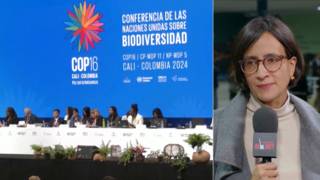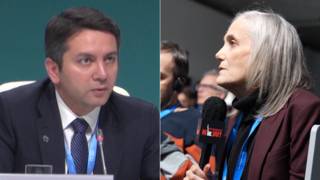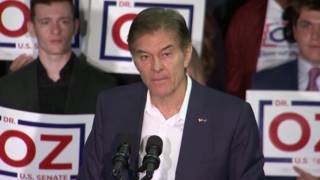
Related
Numerous news outlets and commentators initially blamed the attacks in Norway on Islamic militants. Rupert Murdoch’s British newspaper, The Sun, ran a front-page headline that read, “'Al-Qaeda' Massacre: Norway’s 9/11.” In the United States, Murdoch’s Wall Street Journal also initially blamed “jihadists,” reporting that “Norway is targeted for being true to Western norms.” Meanwhile, on the Washington Post’s website, Jennifer Rubin wrote, “This is a sobering reminder for those who think it’s too expensive to wage a war against jihadists.” To discuss the media coverage of the attacks, we’re joined by Glenn Greenwald, constitutional law attorney and political and legal blogger who has written about the media coverage of the attacks in Norway for Salon.com. “When it became apparent that Muslims were not involved and that, in reality, it was a right-wing nationalist with extremely anti-Muslim, strident anti-Muslim bigotry as part of his worldview, the word 'terrorism' almost completely disappeared from establishment media discourse. Instead, he began to be referred to as a 'madman' or an 'extremist,'” says Greenwald. “It really underscores, for me, the fact that this word 'terrorism,' that plays such a central role in our political discourse and our law, really has no objective meaning. It’s come to mean nothing more than Muslims who engage in violence.” [includes rush transcript]
Transcript
AMY GOODMAN: We turn to the media coverage of the Oslo attacks. Numerous news outlets and commentators initially blamed the attack on Islamic militants. Rupert Murdoch’s British newspaper, The Sun, ran a front-page headline titled “'Al-Qaeda' Massacre: Norway’s 9/11.” Here in the U.S., Murdoch’s Wall Street Journal also initially blamed jihadists, reporting that, quote, “Norway is targeted for being true to Western norms.”
But it was not just the Murdoch empire. On the Washington Post website, Jennifer Rubin wrote, quote, “This is a sobering reminder for those who think it’s too expensive to wage a war against jihadists,” unquote. Once it was revealed that the alleged perpetrator was not a Muslim militant, but a right-wing, anti-Muslim Norwegian nationalist, the New York Times still cited experts as saying, quote, “Even if the authorities ultimately ruled out Islamic terrorism as the cause of Friday’s assaults, other kinds of groups or individuals were mimicking Al Qaeda’s brutality and multiple attacks,” unquote.
To discuss the media coverage of the attacks, we’re joined from Rio de Janeiro, Brazil, by Glenn Greenwald, constitutional lawyer and political and legal blogger, who has written extensively about the media coverage of the attacks in Norway for Salon.com.
Glenn, welcome. Your thoughts as you saw this story unfold through the media?
GLENN GREENWALD: My first reaction was to be pretty surprised about how—or not really surprised, but just struck by how intense the media coverage was and the media interest was in this attack. Obviously, it was a heinous attack. When a government building blows up, when someone goes on an indiscriminate shooting rampage aimed at teenagers, it’s horrific. And yet, at the same time, the United States and its allies have brought killing like this, violence like this, to numerous countries around the world that receives a tiny fraction of the attention that this attack received, a tiny—it prompts a tiny fraction of the interest in denouncing it and in declaring it to be evil. And it just struck me that when we think that Muslims are responsible for violence aimed at Western nations, it receives a huge amount of attention in the American media, and yet when the United States brings violence on that level to Muslim countries, kills an equal number of civilians, dozens of people killed by drone attacks and the like, and tons of people killed that way over Afghanistan over the past decade, it barely registers. I mean, an attack like this, this level of death in Iraq, for example, or Afghanistan, would barely register on the media scale.
The other aspect of it, though, is what you referenced in your question, which is, when it was widely assumed, based on basically nothing, that Muslims had been responsible for this attack and that a radical Muslim group likely perpetrated it, it was widely declared to be a “terrorist” attack. That was the word that was continuously used. And yet, when it became apparent that Muslims were not involved and that, in reality, it was a right-wing nationalist with extremely anti-Muslim, strident anti-Muslim bigotry as part of his worldview, the word “terrorism” almost completely disappeared from establishment media discourse. Instead, he began to be referred to as a “madman” or an “extremist.” And it really underscores, for me, the fact that this word “terrorism,” that plays such a central role in our political discourse and our law, really has no objective meaning. It’s come to mean nothing more than Muslims who engage in violence, especially when they’re Muslims whom the West dislikes.
AMY GOODMAN: Or the term “lone wolf.” Glenn, I wanted to play for you a former Bush administration State Department official, Christian Whiton, who acknowledged the case in Norway wasn’t Islamic terrorism, but he quickly downplayed violent acts committed by those such as Breivik, saying it’s the first of its kind since the Oklahoma City bombing in 1995. Whiton then attacked Norway for its approach to terrorism, claimed European countries are susceptible to terrorism because they’re, quote, “neutral in the war on terror.” He was interviewed on Fox.
CHRISTIAN WHITON: This wasn’t Islamic terrorism. It was—it’s one of the first instances since Oklahoma City when terrorism on this scale was not Islamic. But steps you could take to defend your people and your government and your society against Islamic terrorism would also come in handy against lone wolves, as this is turning out to be. It just looks like the Norwegians didn’t happen to take them, nor do they approach terrorism in what, frankly, is a serious manner, I’d say.
GREGG JARRETT: Yet, Islamic terrorism is a problem in the Scandinavian countries. Were they just sort of turning a blind eye to it?
CHRISTIAN WHITON: Yeah. You know, at the end of the Bush administration, George W. Bush went up to the U.N. His final speech there was on the critical threat from Islamic terrorism. And the current prime minister of Norway, Jens Stoltenberg, actually took the occasion to criticize Bush for going up and said, “Gee, you mentioned Islamic terrorism all these times, but you didn’t talk about climate change,” as if there was some sort of equivalence. You know, a problem in a lot of European countries is they think by being neutral in the war on terror, as if any civilized society can be, that they won’t face the threats that we face. But, you know, that’s just not true. We do know al-Qaeda and the Islamic—
GREGG JARRETT: Yeah.
CHRISTIAN WHITON: —terrorist movements are targeting Scandinavian countries just like the rest of us.
AMY GOODMAN: That was Christian Whiton, questioned by Fox’s Gregg Jarrett. Glenn Greenwald, your response?
GLENN GREENWALD: Well, unsurprisingly, if you combine a Bush terrorism official with Fox News, you’re going to get what you got there, which is too many factually false statements to even count. But I’ll just highlight a couple of them.
One is the idea that Norway is neutral in the war on terror. This was part of the reaction, as well, when people thought that Muslims had been responsible for the attack, which is, why would Norway, such a peaceful, neutral country, possibly be targeted? And the reality is that Norway is part of the war in Afghanistan, and has been for many years. They have a contingent of 500 troops, have been involved in a variety of instances where civilians have been killed. They’re also heavily involved in the war in Libya, having dropped more sorties and—or participated in more sorties, dropped more bombs than even, according to the Norway Post, what they dropped during all of World War II. And so, the idea that they’re neutral is simply a myth. They’re actually engaged in active warfare in at least two different Muslim countries where civilians are being killed and bombs are being dropped.
But more to the point, I think, is this idea that Islamic terrorism is some kind of a unique problem in Europe. There are reports issued each year by the E.U. that count the number of terrorist attacks, both successfully executed and attempted but failed. And each year, for the past five years, the number of attacks perpetrated, in general, exceeds several hundred, 200 or 300, sometimes 400. The number that are perpetrated or attempted by, quote-unquote, “Islamists,” as the report calls it, people driven by Islamic ideology, religion or political grievances, is minute, something like one out of 294 in 2009, zero out of several hundred in 2007. This is the statistic that the E.U. documents every year. There are terrorist attacks in Europe. Sometimes left-wing groups perpetrate them. Sometimes right-wing groups perpetrate them. Sometimes people with domestic grievances, that don’t really fit into the left-right spectrum, attempt them or perpetrate them. But the idea that Islamic terrorism is some sort of unique threat is completely belied by the E.U.'s own statistic. This idea of equating Muslims with terrorism is an incredibly propagandistic and deceitful term. The idea is to suggest that, as several of your guests were saying, that Islam is some sort of existential threat to Western civilization, to Europe and the like, and it's propagated with this myth that terrorism is an Islamic problem. And that’s why the idea that the establishment media in the United States and in political circles equates terrorism, as a matter of definition, with violence by Muslims is so problematic, because it promotes this lie that terrorism is a function of Islamic ideology.
AMY GOODMAN: Glenn, on Wednesday, House Homeland Security Committee chair Peter King, the New York Republican Congress member, will hold his third hearing on Muslim radicalization, focusing on radicalization within the Muslim-American community and the threat to the homeland. Your comment? Glenn, are you still there?
GLENN GREENWALD: Well, that’s one of the interesting things, is you would think that in response to—yes, can you hear me?
AMY GOODMAN: Yes, I hear you fine.
GLENN GREENWALD: That you would think that—you would think that in response to this attack, we would end up doing things like, for example, profiling Nordic males or tall, blond Americans, tall, blond, Nordic-looking people at airports, or would start to, for example, engage in surveillance on the communications of people who belong to right-wing groups in Europe, or you look at the people who inspire these attacks, people like Robert Spencer or Pamela Geller, people who engage in this sort of strident anti-Muslim commentary who inspired this individual. You know, we look at Islamic radicals who we allege inspire violence, such as Anwar al-Awlaki, and we target them for assassination—due-process-free killing—even though they’re American citizens. Of course, none of these measures are going to be invoked against right-wing ideologues who are anti-Muslim in nature. And you would expect that Peter King’s hearings, if he were really interested in the threat of violence or terrorism, would be expanded to include what we now know is a very real threat, and yet it isn’t, which simply underscores that those hearings, like so many of these measures done in the name of terrorism, is really just a vehicle for demonizing Muslims, restricting their rights, subjecting them to increased scrutiny. It’s about Islamophobia and not about terrorism.
AMY GOODMAN: Finally, the lack of coverage over the weekend in the United States was stunning, from Friday night, Saturday, Sunday, this story where so many young people were killed, massive terror attack, hugest terror attack in Norway in its history. Yet in this country, when you go to the networks, cable networks, known for covering a story for many hours at a time, this one almost fell from all the networks except the occasional headline.
GLENN GREENWALD: Well, that was completely predictable. I mean, on Friday, when the attack actually took place, there was quite substantial and intense interest in what had taken place. Everybody was talking about it. There were complaints that—on Friday, that CNN wasn’t running continuous coverage. But in general, there was a lot of media interest, because at the time people thought, based on what the New York Times and other media outlets had said, based on nothing, that this was the work of an Islamic—a radical Islamic group. And at the time, I wrote, when I wrote about the unfolding story, that if it turns out to be something other than an Islamic group that was responsible, especially if it turns out to be a right-wing nationalist who’s anti-Muslim in his views, that interest in this story was going to evaporate to virtual non-existence.
And what’s really amazing is, you know, every time there’s an act of violence undertaken by someone who’s Muslim, the commentary across the spectrum links his Muslim religion or political beliefs to the violence and tries to draw meaning from it, broader meaning. And yet, the minute that it turned out that the perpetrator wasn’t Muslim, but instead was this right-wing figure, the exact opposite view arose, which is, “Oh, his views and associations aren’t relevant. It’s not fair to attribute or to blame people who share his views or who inspired him with these acts.” And it got depicted as being this sort of individual crazy person with no broader political meaning, and media interest disappeared. It’s exactly the opposite of how it’s treated when violence is undertaken by someone who’s Muslim.
AMY GOODMAN: Glenn Greenwald, I want to thank you for being with us, constitutional law attorney, political and legal blogger for Salon.com.












Media Options